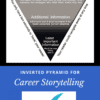
It’s important to identify our level of employability, recognize its advantages and limitations, and work consistently to improve it.
Rapid market changes and disruptive technologies are having an unsettling effect on the job market. They’ve resulted in a new paradigm that indicates the majority of us will not be part of a company’s staffing plans forever, whether we like it or not. In fact, the highest position of CEO, which was once considered immutable, is now the most vulnerable position in an organization as companies merge or are acquired by other companies.
The generation of people beginning their careers today will change their jobs at least seven times before retiring, and four of these moves will be involuntary. Since no one is exempt from involuntary transitions, we should take steps now to prepare for this.
It’s important to identify our level of employability, recognize its advantages and limitations, and work consistently to improve it. We must always ask ourselves, “What skills do I need to have or develop to find a job if I suddenly need to do so? What added value must I contribute to keep my job (if I am already employed) or improve my performance?”
Even when employed, we need to keep in mind that we aren’t paid just to go to work – we’re paid to add value, contribute to results, fulfill specific goals and objectives and satisfy the client’s needs. We need to see the organization as our client, and ourselves as providers of professional or qualified services. And this has nothing to do with our position within the company.
We need to continually evaluate our own level of employability, whether we’re currently employed or in a period of career transition. Consider how you can improve on the following qualities that comprise employability.
1. Identify your accomplishments
In tabulating achievements, many people make the mistake of describing what they did and the responsibilities they had, rather than what they’ve actually achieved – their contribution to the results. It’s important to have a clear and organized list of your achievements, accompanied by quantitative proof of the value that you’re adding to your job.
This means that you need to conduct an ongoing follow-up of your achievements. A good way to review your achievements is by using a system known as PAR: Problem, Action, and Result, which involves identifying the problem or opportunity that existed at a given point in time, explaining the action that was taken, and noting the results generated from this action.
2. Understand your marketplace
Another way to measure your employability is to watch and study the job market, even when you’re not looking for a job. Stay up on any national and international industry news, as well as articles in trade magazines that involve your profession. This way, you can measure the extent to which the market values your position.
3. Keep skills up to date
You will be more employable if you work on the skills valued by the market, which go beyond your knowledge and intelligence, the university you attended or the degree you hold. Update your skills by frequently attending courses or seminars, and in particular, keep up with everything related to the advances in technology that relate to your position.
4. Work your network channels
Ensure through networking that others know what you’re up to and whether you’re available. The majority of today’s jobs are found through one’s own networks. When a job opens up, companies first look informally within the organization or to friends or clients.
5. Establish your personal brand
Be proactive in terms of building your image and personal brand, including within social networks. Think in terms of personal marketing when fine-tuning your digital identity, and continually update your online profiles. Today more than ever before, people find their information about others through Google and LinkedIn. Remember: your personal brand and reputation follow you wherever you go, 24/7.
6. Don’t underestimate the importance of soft skills
Attributes that may seem less tangible can make the difference in who gets – and keeps – the job. This includes values, attitude, passion, creativity, curiosity, charisma, and adaptability. Communication skills also fall prominently into this category. Cultivate the capacity to effectively handle diverse social situations. While your soft skills aren’t quantifiable on a resume, your network can help relay them.
Keep in mind that complacency and arrogance are employability’s worst enemies. To improve employability, we need to persistently sharpen our work skills and social intelligence skills, while ensuring that others know we’re there and available.
If you’d like to read more of our job search articles, feel free to check out the rest of our blog — here.
Or check out these great resources for more advice on getting ahead this Christmas…
- 10 Tips for Success In Your Job Search
- The Role of ATS in Job Search
- 5 Tips for Writing a Killer LinkedIn Profile Summary
Good luck.
Note: content included in this article was originally posted by Ines Temple, president of LHH DBM Peru and Chile — the leading career transition and talent-development organizations in both countries. Ines has provided outplacement services and HR consulting to executives and other workers throughout the world.

